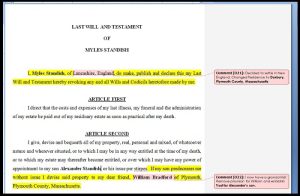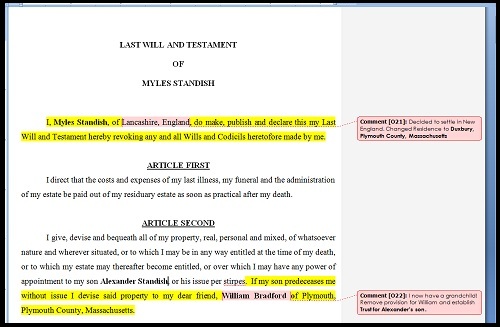 Most couples, whether young, middle aged, or older, need to plan on making regular changes to their estate plan. And while there is no magical number of years recommended for when to have an estate plan reviewed, most practitioners agree that every three to four years is sufficient. But there are special events in life that are good triggers for thinking about modifications.
Most couples, whether young, middle aged, or older, need to plan on making regular changes to their estate plan. And while there is no magical number of years recommended for when to have an estate plan reviewed, most practitioners agree that every three to four years is sufficient. But there are special events in life that are good triggers for thinking about modifications.
Below we have highlighted examples of life events to consider:
A Marriage in the Family
Many couples assume that, upon the death of one spouse (decedent), all assets will pass to the surviving spouse outright. But this is not the case if no will is drafted. Under the new Uniform Probate Code, for example, effective in Massachusetts starting February of 2012, the spouse will take half of all real and personal property in the estate to be shared with surviving children or their children. What happens because of this, and many similar provisions, is that depending on who survives, each descendant may have an awkward share of the other family members’ property and vice versa.
Another concern some have is whether one of their children is married. Some people make sure to draft that only their sons and daughters may have a right to inheritance or to the benefit of a trust, in order to protect against consequences if the marriage should fail.
Getting Divorced
The effect of divorce on a will in Massachusetts is to nullify all provisions devising to the surviving spouse, so that he or she will take nothing from the estate. And so one of the first things each spouse must do after the divorce proceedings have finished is to review their entire estate plans. Most couples, having named one another not only as executors, but as powers of attorney and healthcare proxy agents, will also need to reconsider who it is they trust with these fiduciary and discretionary responsibilities.
Other considerations for divorced couples relate to any trusts that may provide for the health, education and care of children, and non-probate assets naming beneficiaries. Especially with respect to minor or disabled children, certain provisions must be carefully crafted in the absence of a spouse.
Having Children
Whether married or not, a will must have provisions relating to the guardianship of any children who may not yet provide for themselves. Even for those who don’t yet have children, because this is one of the most critical considerations to many parents, individuals should begin to think early about whom is the best choice for a child’s guardian.
Many times a will can create a trust that does not immediately disburse, but holds all of one’s assets for specific distributions to surviving children. No matter how much one has in assets, this can be a key provision for the care of a child upon a parent’s death, which is a critical time for most families.
Approaching Middle Age
This is a time when many individuals and families alike begin to acquire a greater amount of assets. Having a combined net worth that exceeds the federal or Massachusetts estate tax becomes a concern at this point as the family home, retirement plans and insurance proceeds will have appreciated in value. Assets in an estate will trigger tax liability if they reach or exceed $5 under the federal estate tax, or $1 million under the Massachusetts estate tax as of 2011.
And while many families may expect their estate to fall short of those amounts, many factors could dictate otherwise. On Cape Cod, for example, where many purchased modest homes in the 1980s, few expected the extent to which certain neighborhoods underwent significant growth during the intervening years. An experienced estate planning attorney will insert a formula in your will to minimize estate taxes resulting from any such unforeseen appreciation of assets.
Remarriage, Inheritance, and the Law
Couples often forsake any talk about assets and inheritance in the name of romance when they are getting married. Naturally, they are a bit more careful upon a second marriage. With that in mind, it is a good idea for the couple to discuss how the provisions in each spouse’s will can provide for one another, yet still pass something on to existing children.
Often, for example, each spouse will form a Qualified Terminable Interest Property Trust, a.k.a. “Q-TIP Trust” that provides income during the surviving spouse’s life, but ultimately passes to children of the original marriage.
Such an arrangement can also minimize estate tax liability, since the trust proceeds do not increase the surviving spouse’s estate assets. In considering some of these more complex estate law provisions, consulting with a Massachusetts estate law attorney is highly recommended.
Death
One of the most important and critical times in life, and thus in the life of one’s estate, is when one spouse in a marriage passes away. Such an event is emotionally taxing, and can leave loved ones prone to financial mistakes or worse, unable to make any decisions at all.
It is nevertheless a critical time to take an opportunity to consult with an attorney or some other third party on how your life and estate are affected. A new will, power of attorney and healthcare proxy should be executed as soon as possible, and loved ones should be made aware of the surviving spouse’s end of life plans.
Rule of Thumb
A periodical review with one’s estate planning attorney is simply the smartest way to ensure the family is making the best use of its assets. Because births, deaths, marriages and divorces, and even the acquisitions of new property are usually emotional events, few tend to think at the time of changing their estate plans. But a good rule of thumb to consider is, if something big happens in life, it’s time to review the estate.




